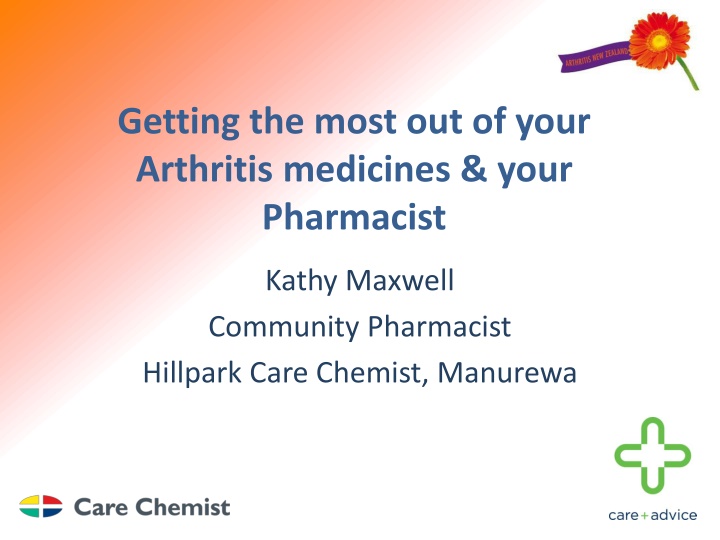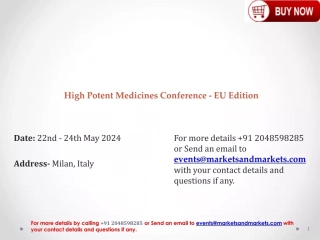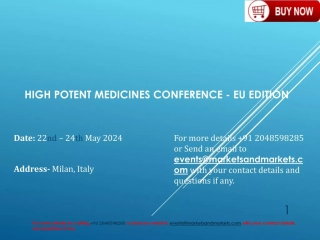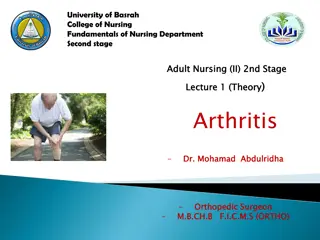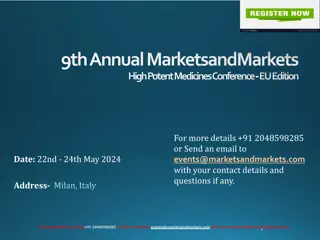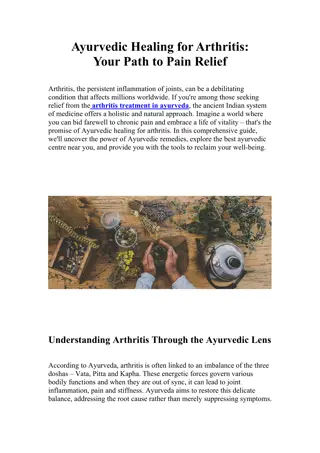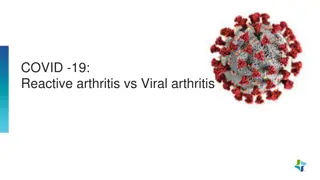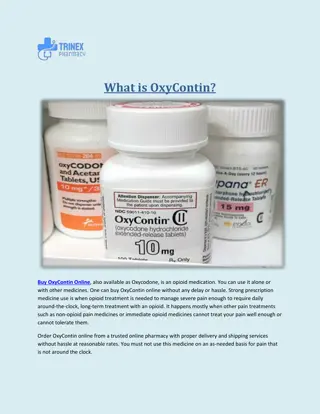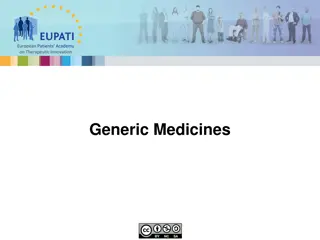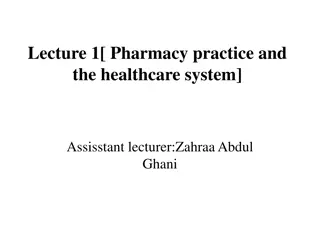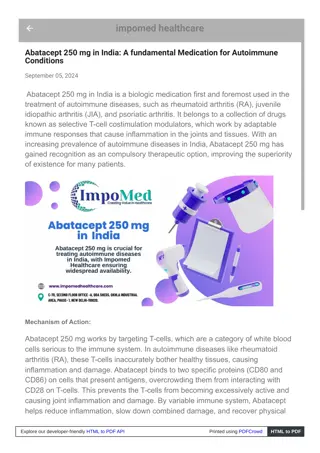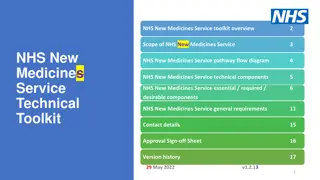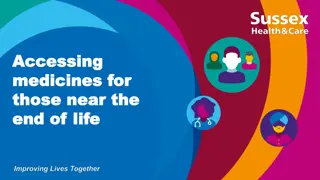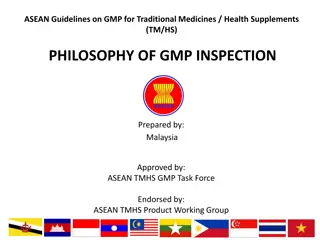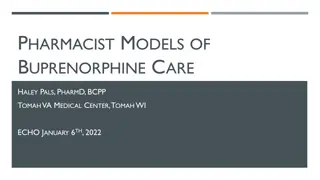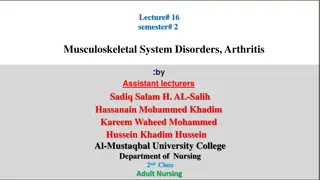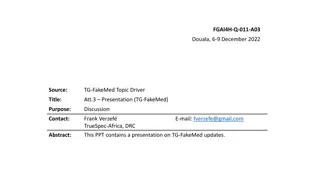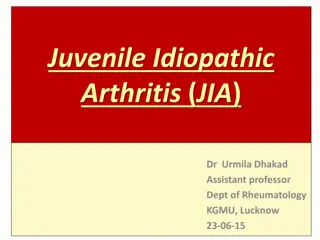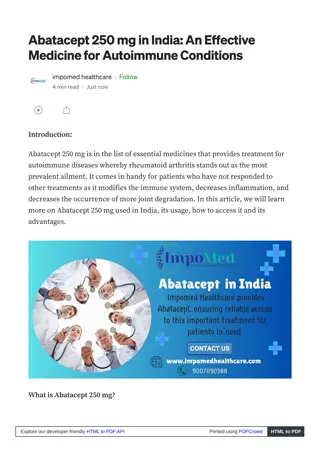Getting the Most Out of Arthritis Medicines: A Pharmacist's Role
Pharmacists play a crucial role in managing arthritis by advising on medication usage, preventing joint damage, and ensuring adherence to treatment plans. Learn about effective medication management, regular monitoring, and lifestyle adjustments for optimal arthritis care.
Download Presentation

Please find below an Image/Link to download the presentation.
The content on the website is provided AS IS for your information and personal use only. It may not be sold, licensed, or shared on other websites without obtaining consent from the author.If you encounter any issues during the download, it is possible that the publisher has removed the file from their server.
You are allowed to download the files provided on this website for personal or commercial use, subject to the condition that they are used lawfully. All files are the property of their respective owners.
The content on the website is provided AS IS for your information and personal use only. It may not be sold, licensed, or shared on other websites without obtaining consent from the author.
E N D
Presentation Transcript
Getting the most out of your Arthritis medicines & your Pharmacist Kathy Maxwell Community Pharmacist Hillpark Care Chemist, Manurewa
Pharmacists Role Pharmacists are the scientist, the medicine adviser, the clinical practitioner, the social carer, the medicine maker, the medicine supplier, the manager, the business person and the unremarkable character. (List from 43 pharmacists in UK) A student pharmacist described us as a link between chemical and health science.
Pharmacists Role For me its all about people. Your Pharmacist plays a major role in your care New Zealand Community Pharmacists LTC helping with adherence What is adherence? it is an agreed plan between a health professional and the patient
What do we want medicines to do? Manage symptoms especially pain and without side effects Prevent damage to joints Maintaining Joint function
What do we want medicines to do? Management requires continual review and ongoing lifestyle modifications. This is a general presentation and if you have any concerns about what I say please feel free to ask me any questions you may have.
Making the most of your medicines Medication is an important element in arthritis management, together with lifestyle measures and other therapies. Take them at the right time and in the right way Look out for side effects or signs that you aren t getting any better (or getting worse)
Making the most of your medicines If you need medicines regularly make sure you always have enough of your medicines. Your community pharmacist can help you with reminder services - Compliance packs - A phone call to say you need a new script
Questions to ask about your medicines What am I taking this medicine for? Does this new prescription mean I should stop taking any other medicines? How long and when should I take my medicine?
Questions to ask about your medicines Are there any food, drinks, or other medicines to avoid while I m taking this medicine? Why is that important? What are the potential side effects? What should I do if I think I have a side effect? What should I do if I miss a dose?
Questions to ask a health professional If you are thinking about stopping a medicine, or not taking a medicine you have been prescribed You are finding it difficult to take a medicine as it was prescribed You are worried or concerned about side effects that you are experiencing You find it difficult to remember to take your medicines
Health Literacy a person s ability to obtain, process and understand basic health information and services in order to make informed and appropriate health decisions
What your Pharmacist can do Help you to understand your medicines so that you can make decisions about your treatment. What they do? How to use them? Discuss your experiences of taking or not taking medicines, your views about what medicines mean to you and how medicines affect your daily life.
What your Pharmacist can do Look for ways for you to get, take or use your medicines that fit in with your daily life. If you have any problems with your medicines help you to find solutions that you find acceptable.
Types of medications used in Arthritis Analgesics Non-steroidal anti-inflammatory drugs (NSAIDs) Cox-2 inhibitors Corticosteroids Disease-modifying anti-rheumatic drugs (DMARDs) Biologic response modifiers (BRMs).
NSAIDs Making safer choices What is bpac? NSAIDs ( Non Steroidal Anti-Inflammatories) can be associated with serious adverse effects in susceptible patients Paracetamol is the first choice as an analgesic
NSAIDs Making safer choices Naproxen (up to 1000mg per day) or ibuprofen (up to 1200mg per day) are recommended as first line NSAIDs based on cardiovascular risk Lowest effective dose, for the shortest possible time. Your age and the condition being treated needs to be considered
How NSAIDs work The cyclo-oxygenase (COX-1 and COX-2) enzymes produce prostaglandins (Pg) following the metabolism of omega-6-polyunsaturated fatty acid (arachidonic acid). Pg are chemical messengers that mediate inflammation, fever and the sensation of pain. Analgesic and anti-inflammatory effects of NSAIDs are produced through the prevention of Pg production by inhibition of COX activity.
Cox-1 and Cox-2 The difference Cox-1 are widely distributed in the body, but concentrated in the cells of the stomach, kidneys and endothelium and in platelets Pg catalysed by COX-1 activity control renal perfusion, promote platelet aggregation and provide gastroprotection by regulating mucous secretion. Inhibition of COX-1 can cause adverse GI effects.
Cox-1 and Cox-2 The difference COX -2 is induced by inflammation and is present in macrophages, leukocytes and synovial cells. Pg formed via COX-2 activity mediate pain, inflammation, fever and inhibit platelet aggregation NSAIDs that inhibit both COX -1 and 2 are called Non-Selective NSAIDs, while those that inhibit COX-2 enzymes are termed COX-2 inhibitors
NSAIDs and COX inhibition Ibuprofen, naproxen and diclofenac are non-selective, however diclofenac inhibits more COX-2 than Cox-1 Meloxicam low dose mainly inhibits COX-2, as dose increases then COX-1 is increasingly inhibited. Funded with Special Authority. Celecoxid and etoricoxib COX 2 inbibitors. Not funded.
Adverse Effects of NSAIDs Cardiovascular COX-2 were developed because of less GI, but found that COX-2 activity blocks platelet aggregation (opposite to Aspirin) so more chance of a MI Gastrointestinal increased risk with long acting formulations Renal failure Block COX-2 then reduce blood flow to kidney Problem in dehydration Bigger problem in diabetes Hypersensivity reactions
Paracetamol Compared to NSAIDs Minimal GI toxicity Little effect on blood pressure No association with MI No interaction with the anti-platelet effect of aspirin.
All medicines have risks and benefits Benefits Risks
Reducing the Risk of NSAID use Make sure that if you buy OTC products they don t contain NSAIDs Consider risk factors CV Disease, CKD, duodenal ulcers Watch for other products that may interact with NSAIDs ACE inhibitors, diuretics, warfarin, dabigatran, aspirin Talk to your medical team
Cardiovascular Risk Factors Previous Cardiovascular event Heart Failure (double risk Triple Whammy) Increase systolic blood pressure 2-3 mmHg
Gastrointestinal Complications GI risks double with NSAIDs (COX-1 produces protective gastric mucous) Take NSAIDS with food or milk so stomach is not empty May take a PPI prophylactically regularly
Complementary Therapies Likely Effective Glucosamine sulphate (osteoarthritis) SAMe (osteoarthritis) Possibly Effective (Selection) Acupuncture (osteoarthritis) Avocado (osteoarthritis) Beta-carotene (osteoarthritis) Borage (Rheumatoid arthritis) Bromelain (osteoarthritis) Fish Oil (Rheumatoid arthritis) NZ Green Lipped Mussel (Osteo and Rheumatoid arthritis)
What can your Pharmacist offer you? Clinically researched information Put you in contact with support mechanisms Suggest some lifestyle options to help you manage better Someone to talk with around your condition Referral onto other health professionals such as physiotherapists How to prevent gout attacks? Condition information
